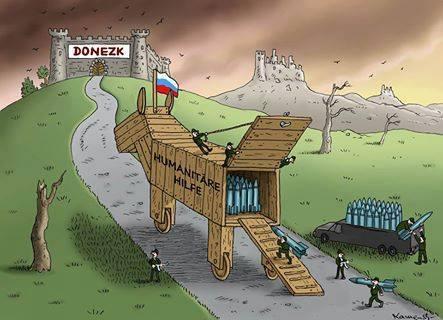Russia is always struggling to improve its positions in Europe, to expand its influence, to earn more money...

Russia is always struggling to improve its positions in Europe, to expand its influence, to earn more money, to retain image of a respectable country and to ensure a safe habour for the richest Russians and their dubious wealth.
However, European institutions began to take timid steps to limit Moscow’s efforts to corrupt European business and to lobby its political and economic interests only a few years ago. Economic might of Europe is a sole obstacle which prevents Putin’s Russia from becoming a repressive Hitler-style superpower. Russia is unable to defeat Europe in a fair competition - it is not strong enough. But it can weaken its opponent and thus become a winner.
Russia’s lagging economy cannot keep pace with the European one. However, there are more ways to the wood than one. Thus, the Kremlin has adopted a tactics built on a well-known Karl Marx’s theory. If it is impossible to undermine basis of society, you may try to destroy the superstructure, provoke inner crisis and win in the long run.
Russia spares neither influence nor resources to form public opinion favourable for it. It sponsors international political and business fora, exhibitions, concerts, sports events. Russian nouveaux riches prefer to take part in acts of charity in Europe, not at home, because their key task is not to help people in need but to assist pro-Russian lobby in EU. Moscow also maintains some European media, NGOs, parties and politicians.
The main recipients of Russian aid are European far-right-wing parties. Their declared aim is to defend national states inside the EU. This task is in line with Moscow’s priority to separate one Member State from another and to split unity of the EU. Rightists consider Putin to be a model of a strong leader who has courage to challenge “the West” and to contest the US position in the world. It’s worth to notice that the Enemy Number 1 for European right-wingers is the USA. That is one of the reasons why rightists do support Russian aggression towards Ukraine (They believe that the USA became a key sponsor of conducting reforms in Ukraine just to underline once more US superiority over Europe and Russia).
Ultra-rightists and nationalists have become influential force in European politics. They have expanded their electoral base and increased the number of seats in the national parliaments and the European Parliament. The 2014 European Parliament elections were revealing in this context. Euroskeptics and right-wingers won 98 of 751 seats.
The Front National’s success in France came as a shock in the country and the EU. The party received 24 of France’s 74 mandates in the 2014 European Parliament elections. Marine Le Pen, the leader of the Front National, is a Putin’s devoted supporter and she makes no secret of her liking for the Russian president. This victory was echoed by the UK Independence Party in the United Kingdom. The party headed by Nigel Farange received 24 mandates in the 2014 European Parliament elections too and became the largest UK party in the EP. It was the first time for over a century that a party other than the Labour or the Conservative won a nation-wide election. A few right-wingers from the other EU MS (the Netherlands, Hungary, Germany, Bulgaria, Poland, Lithuania, Finland) also became Europarliamentarians. As a result, every seventh member of a new EP has anti-EU and pro-Russian sentiments! What a chance for the Kremlin to cause a quarrel between European states and to strengthen its control over European scene!
Moscow is generously sponsoring its lobby in Europe, however, it is difficult to prove the facts of such an assistance because it strongly resembles bribery or espionage. But sometimes the truth comes to light. A Hungarian far-right MEP Bela Kovacs was accused of acting as a Russian spy. Hungarian Prosecutor General’s office turned to the EP President requesting the revocation of Kovacs’ immunity status. The inquiry of Kovacs’ possible illicit activity is underway.
Many of the European far-right parties do not even hide the fact of having ties with Russia and Russian nationalists nevertheless. Bulgarian ”Attack”, Hungarian “Jobbik” (the above Kovacs is a representative of the party), Greek “Golden Dawn” are vocal advocates of pro-Russian politics. Nobody was surprised that they welcomed the illegal “independence referendum” in the Crimea and sent their observers to elections (if it is possible to describe process when voters are held at gunpoint as ”free election”). It was the puppet observers’ presence that entitled the Kremlin to declare the referendum legal and valid. The Kremlin has got the hang of using puppets long ago. The puppets are proud of their parts, and grateful for rewards and consider themselves being independent.
Close cooperation between Russia and European far-right parties is fraught with the threats to European democratic values. The far-right and nationalist parties are not in the majority in the EP yet. However, they do have leverages to influence decision making process and these decisions may influence not only the EU functioning but everyday life of each European.
European right-wingers believe that Russia is the country with firm family and Christian values. The country is indebted to Putin for traditional national interests preservation. Putin’s dictatorship is a means of consolidation of people. Rightists may want to force Europeans to follow the pattern they are fond of. Here is a real danger. Money and power are very significant things, but they are not “uber alles”.
Achievements of democracy aimed to make life of every human being better are real everlasting virtues. Let’s defend them and beware of Russians bearing gifts.
